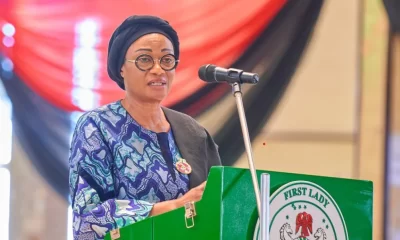Business
Hidden N13.11tn debt exposed, as report reveals increasing CBN Overdraft to FG
Published
5 years agoon
By
Olu Emmanuel
The Debt Management Office in Nigeria appeared to have tacitly ignored the inclusion of N13.11 trillion overdraft the Central Bank of Nigeria (CBN) granted to the federal government in the computation of Nigeria debt stock.
The Debt Management Office (DMO) had in its recent statement on Nigeria’s Public Debt Stock as at March 31, 2021, indicated that the Total Public Debt Stock which comprises of the Debt Stock of the Federal Government of Nigeria (FGN), 36 State Governments and the Federal Capital Territory (FCT) stood at N33.107 trillion or USD87.239 billion.
The DMO further indicated that the Domestic Debt Stock was N20.637 trillion as of March 31, 2021.
However, a research report by Cordros Capital indicated that as a result of continuous revenue drop, the Central Bank of Nigeria (CBN) overdraft to the federal government increased to N13.11 trillion at the end of the fiscal year 2020.
Cordros Capital Analyst had stated that the N13.11 trillion overdraft from the CBN was not included in the Domestic Debt Stock of N20.637 trillion as of March 31, 2021, or the total debt profile of N33.107 trillion.
Cordros Capital analyst, Abdulazeez Kuranga, was cited to have declared that “It is after they securitize the ways and means, that it will be included.” Thus, Nigeria’s debt profile may have been under evaluated by the DMO. When the N13.11 trillion CBN overdraft will be added, the Domestic Debt Stock will be N33.747 trillion rather than N20.637 trillion as of March 31, 2021; while the total debt profile will be N46.217 trillion rather than N33.107 trillion.
Other international rating agencies which include Fitch, Agusto & Co, etc., were gathered to have pointed out in separate reports that Nigeria’s monetary policy authority (the CBN) has consistently breached its 5% guideline on Ways and Means (W&M) lending.
The report had indicated that fiscal slippage or inability of the government to generate an amount needed to finance both recurrent and capital expenditure resulted in heavy reliance on CBN financing between 2016 and 2019. The government has also been incurring loans and accumulating debts from foreign countries.
According to the report, “It is common practice for governments to make recourse to the debt market to finance budget deficits. However, developing countries with large fiscal slippages and weak debt markets tend to rely on their monetary authorities to bridge fiscal deficits.”
It was observed that decline in the global oil prices and volume output almost grounded government spending capability in Nigeria, as the country’s revenue generation is concentrated on oil export.
Cordros analysts in the new report, disclosed that actual revenue has fallen short of budgeted revenue by an average of 39.3% between 2016 and 2019, while expenditure was below the prorated budget by 13.2% within the same period.
Nigeria’s actual revenue was said to have grown by 39.8% between 2016 and 2019, while expenditure -excluding Government-Owned Enterprises – surged faster by 61.3% within the same period.
Cordros Capital report had indicated that outstanding overdrafts to the federal government rose from N2.63 trillion, translating to 2.6% of GDP in 2016 to N8.72 trillion or 6.0% of GDP in 2019.
The report had maintained that “Given the impact of the twin shocks (the pandemic and downturn in oil prices) on government finances in 2020, the Ways and Means balance increased by N4.39 trillion to N13.11 trillion as of December 2020.”
Cordros Capital analysts stated that during the economic recessions in 2016 and 2020, the government increased reliance on CBN financing due to the need to reflate the economy.
Cordros Capital highlighted: “This may be justified given the large size of the public sector and the need for an expansionary fiscal policy.
“For instance, due to the magnitude of the shocks in 2020, the actual amount of borrowing from the W&M stood at NGN4.39 trillion – the highest since 2007 when the CBN started keeping the data.
“However, we observed that during periods of relatively stable macro conditions – GDP growth of 1.91% in 2018 and 2.27% in 2019 – the FGN still relied more on the CBN to finance its operations than tax revenue.”
The report indicated that the preceding stemmed from underperformance in actual revenue compared to budgeted revenue amidst a persistent increase in total expenditure. The report noted that the actual fiscal deficit widened ahead of budget.
Cordros further explained that to provide a better context, the average yearly W&M of N2.45 trillion to the FGN over the past five years (2016 to 2020) was 127.0% above the average yearly tax revenue of N1.08 trillion during the same period.
The analysts observed that “When viewed as a percentage of total revenue, we note that the average W&M to the FGN was 58.6% between 2017 and 2019 – significantly above the averages of 0.0% and 0.8% for Ghana and Kenya, respectively”.
The report stated that the situation becomes more precarious when the analysts compare CBN’s W&M with total borrowings over time.
Cordros Capital asserted that “… for every one-billion-naira total borrowing obtained on average between 2018 and 2019, the FGN obtains an additional two billion naira in W&M from the CBN on average during the same period.”
The firm also noted that with the deterioration in debt service/revenue ratio from 44.6% in 2016 to 59.6% in 2019, the government has been compelled to rely on cheaper financing from the Central Bank.
Cordros Capital, however, pointed out that borrowing from the CBN breeds fiscal complacency, noting that efforts and initiatives required to strengthen tax administration and expand the tax net may be delayed.
The analysts decried that the overdraft also reduce CBN’s asset quality, a situation that draws multilateral lenders attention in recent times.
Cordros Capital had cautioned in the report: “A major challenge that deficit monetisation presents is that it weakens the balance sheet of the CBN – increased lending to the FGN without periodic repayment and or Securitisation reduces the apex bank’s asset quality, which has a negative impact on shareholders’ funds.
“This would send negative signals to foreign investors on macroeconomic stability, amplify capital flow reversals during adverse economic conditions and make investors demand higher rewards in the form of a risk premium.”
The firm noted that ordinarily, a one-off deficit financing by money creation may only generate a one-off increase in the price level without any material impact on long-term inflationary trends.
It argued that if deficit monetisation becomes a recurring theme, it could lead to sustained inflationary pressures that will make the attainment of price stability more difficult.
The Analysts attributed the rising headline inflation rate to the CBN monetisation, noting that over the last two years, the headline inflation rate has diverged materially from the medium target of 6.0%-9.0% and the long-term average of about 12.0%.
Cordros Capital warned that “Considering that the FG spending pattern is skewed towards recurrent expenditure, which typically results in increased money in circulation, continuous recourse to Central Bank financing could complicate inflation targeting.”
The firm stated that the practice has the tendency to worsen the local currency and drive external sector pressures, adding that real returns on naira-denominated investments would remain negative or low in the medium to long term.
Analysts insisted that with the local currency still susceptible to external shocks, domestic investors are likely to take solace in foreign asset investments, which would amplify exchange rate pressures.
The report stated that “Increased domestic inflation relative to foreign inflation increases the overvaluation of the domestic currency, especially in countries that utilise managed exchange rate systems.”
The report added that as the currency becomes more overvalued and the price level increases, imports would likely increase relative to export, putting the Current Account in a deficit position.
“Based on these, we think persistent CBN’s financing of the FGN’s deficit would further deteriorate the overall macroeconomic stability conditions of the country over the medium-term if not urgently addressed”, the report indicated.
Agusto & Co were gathered to have disclosed in a report that FG borrowings from the CBN in the last five years have expanded more than 500%. The CBN has, however, reported N2.864 trillion deficit financing in its book in 2020.
Trending

 Entertainment7 days ago
Entertainment7 days agoSinger Simi faces backlash after TikToker admits to false rape allegation

 Entertainment4 days ago
Entertainment4 days agoSimi addresses resurfaced 2012 tweets amid online backlash

 Comments and Issues6 days ago
Comments and Issues6 days agoNigeria’s Declining Oil Output and Soaring Foreign Portfolio Investment Inflow

 Business7 days ago
Business7 days agoPENGASSAN warns Tinubu’s executive order on oil revenues could jeopardise 4,000 jobs

 Comments and Issues6 days ago
Comments and Issues6 days agoEx-prince Andrew’s arrest, lessons for Nigeria

 Health1 week ago
Health1 week agoNanoplastics may disrupt brain cells that control puberty, fertility, study finds

 Health5 days ago
Health5 days agoSCFN, LUTH introduce bone marrow transplants as curative treatment for sickle cell

 Editorial Opinion1 week ago
Editorial Opinion1 week agoFirst Lady, Senator Oluremi Tinubu: A call to purpose beyond symbolism

